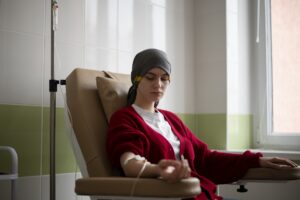Living with cancer can be an incredibly challenging journey, both physically and emotionally. Coping with the impact of the disease requires strong support systems and effective strategies. In this article, we will explore various coping strategies and support systems available to those living with cancer.
By understanding and utilizing these coping strategies and support systems, individuals living with cancer can find strength, hope, and a sense of community during their journey. Let’s discover how to navigate the challenges of living with cancer together.
Understanding the Emotional Impact of a Cancer Diagnosis
Receiving a cancer diagnosis can be an overwhelming and emotionally charged experience. It is essential to acknowledge and understand the emotional impact it has on an individual’s life. Fear, anxiety, anger, and sadness are common emotions that arise when faced with a cancer diagnosis.
One of the most crucial coping strategies during this time is to allow oneself to feel and process these emotions. It is normal to experience a range of emotions, and suppressing them can be detrimental to one’s mental and emotional well-being. Seeking support from loved ones, therapists, or support groups can provide a safe space to express these emotions and receive validation and understanding.
Moreover, educating oneself about the specific cancer diagnosis and treatment options can help in reducing anxiety and uncertainty. When armed with knowledge, individuals can make informed decisions about their treatment and actively participate in their healthcare journey.

Coping Strategies for Managing the Emotional and Psychological Challenges
Cancer can bring about a myriad of emotional and psychological challenges that can be difficult to cope with. However, there are various coping strategies that can help individuals navigate these challenges and maintain a positive mindset.
Mindfulness techniques, such as meditation and deep breathing exercises, can be immensely helpful in reducing stress and promoting emotional well-being. These practices allow individuals to focus on the present moment, letting go of worries about the past or future. By cultivating mindfulness, individuals can develop resilience and better manage the emotional ups and downs associated with cancer.
Engaging in regular exercise has also been shown to have a positive impact on emotional well-being. Physical activity releases endorphins, which are natural mood elevators, and can help reduce anxiety and depression. Whether it’s going for a walk, practicing yoga, or participating in gentle exercises, finding an activity that suits one’s abilities and interests can provide a much-needed outlet for emotional release.
Additionally, creative outlets such as art therapy, writing, or playing a musical instrument can serve as powerful coping mechanisms. Engaging in creative activities allows individuals to express their emotions, find solace, and gain a sense of control over their experiences. It can also provide a distraction from the challenges of cancer and foster a sense of accomplishment and self-expression.
Building a Support System: Family, Friends, and Support Groups

Having strong support systems is vital for individuals living with cancer. Family, friends, and support groups can provide emotional support, practical assistance, and a sense of belonging during this challenging time.
Loved ones play a crucial role in providing emotional support and understanding. They can offer a listening ear, a shoulder to lean on, and a source of comfort and encouragement. Simply knowing that there are people who care and are there for them can make a significant difference in an individual’s well-being.
Support groups, whether in-person or online, offer a unique space for individuals to connect with others who are going through similar experiences. Sharing stories, exchanging advice, and finding common ground can provide a sense of validation, understanding, and camaraderie. Support groups can also offer practical information and resources that can help individuals better navigate their cancer journey.
In addition to personal support networks, there are numerous support organizations dedicated to helping individuals with cancer. These organizations provide a wide range of services, including financial assistance, transportation to medical appointments, and access to counseling and therapy. Connecting with these organizations can provide individuals with additional support and resources tailored to their specific needs.
The Role of Healthcare Professionals in Supporting Cancer Patients
Healthcare professionals, including doctors, nurses, and therapists, play a critical role in supporting individuals living with cancer. They provide not only medical care but also emotional support and guidance throughout the treatment process.
Doctors and nurses are responsible for explaining the diagnosis, treatment options, and potential side effects in a clear and compassionate manner. They can address any concerns or questions individuals may have, easing their anxieties and providing reassurance. Regular check-ups and appointments also allow healthcare professionals to monitor progress, adjust treatment plans, and provide ongoing support.
Therapists, such as psychologists or counselors, can offer specialized support to help individuals cope with the emotional and psychological challenges of living with cancer. They provide a safe space to discuss fears, anxieties, and any other emotional difficulties. Therapists can also teach coping skills and techniques to manage stress and improve overall well-being.

Self-Care and Self-Compassion During Cancer Treatment
Self-care is crucial for individuals living with cancer. Taking care of oneself physically, emotionally, and mentally can contribute to a better quality of life and overall well-being. Practicing self-compassion is equally important, as it allows individuals to be kind to themselves during this challenging time.
Physical self-care involves prioritizing rest, eating a balanced diet, and engaging in activities that promote overall health. It is essential to listen to one’s body and give it the rest and nourishment it needs to heal and recover.
Emotional self-care involves acknowledging and expressing emotions in a healthy way. This can be done through journaling, talking to loved ones, or seeking professional help. It is vital to allow oneself to grieve and process emotions while also focusing on cultivating positive emotions and finding joy in daily life.
Mental self-care involves engaging in activities that stimulate the mind and promote mental well-being. This can include reading, solving puzzles, learning new skills, or practicing mindfulness and meditation. Taking time for oneself and engaging in activities that bring pleasure and fulfillment can help individuals maintain a positive mindset and cope with the challenges of cancer.
Integrating Complementary Therapies for Additional Support
Complementary therapies can offer additional support to individuals living with cancer. These therapies, which are used alongside conventional medical treatments, can help alleviate symptoms, improve well-being, and enhance the overall treatment experience.
Acupuncture, for example, has been shown to reduce nausea, pain, and fatigue commonly associated with cancer treatment. It involves the insertion of thin needles into specific points on the body to stimulate energy flow and promote healing. Many individuals find acupuncture to be a relaxing and effective therapy that complements their medical treatment.
Massage therapy is another complementary therapy that can provide physical and emotional benefits. It can help reduce muscle tension, alleviate pain, improve circulation, and promote relaxation. Massage therapy can also be a source of comfort and nurturing touch during a time when individuals may be experiencing physical discomfort and stress.
Other complementary therapies, such as aromatherapy, yoga, and Reiki, can also contribute to the overall well-being of individuals living with cancer. It is important to consult with healthcare professionals and experienced practitioners to determine the most appropriate complementary therapies based on individual needs and preferences.
Navigating the Financial and Practical Aspects of Living with Cancer
Living with cancer often comes with financial and practical challenges that need to be addressed. Navigating these aspects can help individuals focus on their treatment and well-being without added stress.
Financial assistance programs and resources are available to help individuals manage the costs associated with cancer treatment. These programs can provide support with medical bills, medication costs, and other related expenses. It is essential to explore available options and seek guidance from healthcare professionals or support organizations to access these resources.
Practical assistance, such as help with household chores, transportation to medical appointments, or childcare, can significantly lighten the burden for individuals living with cancer. Family, friends, support organizations, or community services can provide assistance in managing these practical aspects, allowing individuals to focus on their health and recovery.
Organizing medical records, keeping track of appointments, and staying informed about treatment plans can also help individuals feel more in control of their cancer journey. Utilizing technology, such as smartphone apps or digital calendars, can simplify these tasks and ensure that important information is easily accessible.
Sharing Personal Stories of Resilience and Hope

Personal stories of resilience and hope can provide inspiration, encouragement, and a sense of connection for individuals living with cancer. Hearing about others who have successfully navigated their cancer journey can instill a sense of hope and optimism.
Sharing personal stories can also help reduce the stigma surrounding cancer and raise awareness about the challenges individuals face. It can foster empathy and understanding in the wider community and encourage support and compassion for those living with cancer.
There are various platforms, such as blogs, podcasts, or support group meetings, where individuals can share their stories. By speaking openly about their experiences, individuals can contribute to a supportive and empowering community that uplifts and inspires others.
Conclusion
Living with cancer is undoubtedly a challenging journey, but it is important to remember that there are coping strategies and support systems available to help individuals navigate this difficult time. From finding emotional support through therapy or support groups to incorporating self-care practices and exploring complementary therapies, individuals have a range of tools at their disposal.
Building strong support systems, including loved ones, support organizations, and online communities, can provide a sense of belonging and understanding. Healthcare professionals play a crucial role in providing medical care and emotional support, while financial and practical assistance can help alleviate additional stress.


